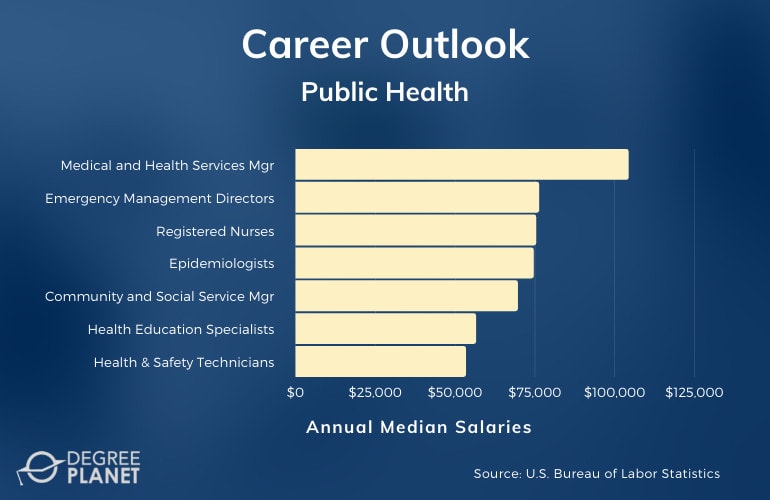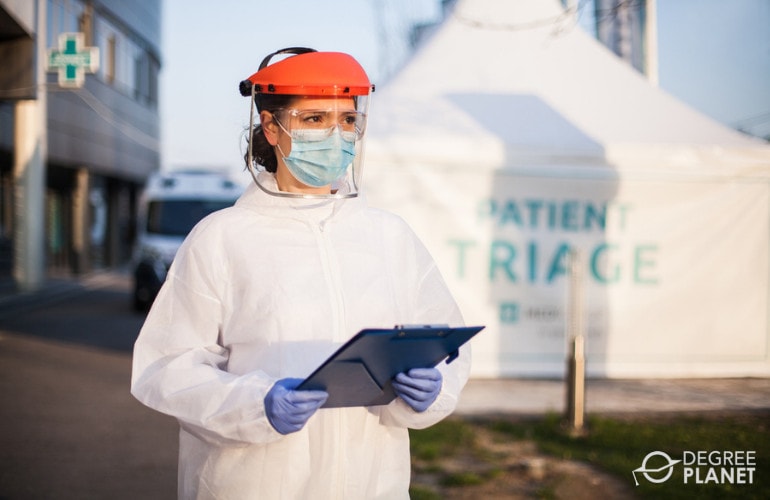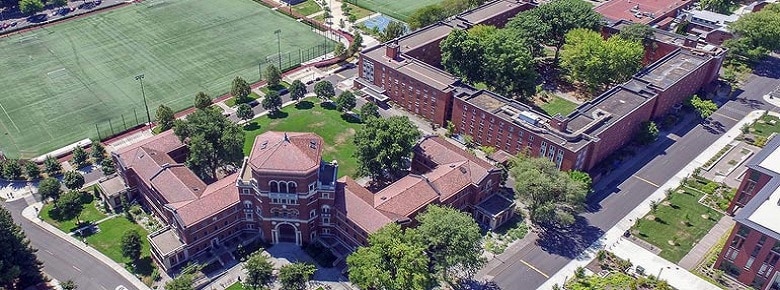Earning an online public health degree can be the key to launching a career that makes a difference for others’ health, safety, and overall wellbeing.

Public health professionals are committed to improving health outcomes for entire communities or populations. They can be researchers, scientists, educators, advocates, policymakers, care providers, managers, and more.
Editorial Listing ShortCode:
If you think this could be the right field for you, you may want to take a look at the many benefits of online bachelor degrees in public health.
Public Health Degrees Online

The field of public health focuses on health and safety at the population level. Public health professionals try to help groups of people live the healthiest lives that they can. They use education, research, and other avenues to accomplish this goal.
Typically, doctors and nurses work with one patient at a time and address individual healthcare needs. Public health is different because it addresses the health needs of entire groups. While public health pros sometimes work one-on-one with people, the overall goal is to improve community-wide wellbeing.
In a public health bachelor’s degree program, you’re likely to study topics like:
- Behavioral change
- Childhood wellness and diseases
- Environmental health
- Epidemiology
- Healthcare access and equity
- International health issues
- Organizational leadership
- Policymaking
You might also have the chance to select a degree concentration, such as biostatistics, epidemiology, global health, leadership, or public policy.
Editorial Listing ShortCode:
Your school may offer internship opportunities as well. You could spend time working alongside public health professionals in a local health department, a federal agency, a community nonprofit, an advocacy group, a healthcare facility, or a research center.
Public health graduates can work in a variety of health-focused jobs. Common careers include community health worker, health educator, emergency management director, and occupational safety technician.
In addition, a degree in public health can pair well with other educational pursuits. For example, nurses may want to add a public health degree to their schooling so they can be more suitable candidates for jobs in public health nursing.
Some graduates decide to continue their public health education by pursuing a masters degree in epidemiology, biostatistics, toxicology, or another subset of the public health field.
Public Health Careers and Salaries

The jobs of public health professionals are related to keeping communities safe and well. There are a variety of ways to carry out that mission.
Health education specialists teach people how to be healthy. They may distribute literature, teach classes, or lead programs. Health educators often work for the government, such as in public health departments.
Community health workers connect people to healthcare services. They may provide information or conduct basic health tests. Like educators, they often work for government agencies.
According to the Bureau of Labor Statistics, health education specialists and community health workers earn a median annual salary of $48,140.
| Careers | Annual Median Salaries |
| Medical and Health Services Managers | $104,280 |
| Emergency Management Directors | $76,250 |
| Registered Nurses | $75,330 |
| Epidemiologists | $74,560 |
| Community and Social Service Managers | $69,600 |
| Health Education Specialists | $56,500 |
| Occupational Health and Safety Technicians | $53,340 |
| Community Health Workers | $42,000 |
| Agricultural and Food Science Technicians | $41,970 |
| Social and Human Service Assistants | $35,960 |
Some of the above careers require additional training. For example, professionals in epidemiology need to have at least a master’s degree, and working as a public health nurse requires nursing training and licensure.
Some public health students plan to go into research. Epidemiology, biostatistics, and biometrics could be suitable fields. Researchers may work for government agencies or hospitals.
Some public health workers focus on making daily activities safer for people. They can work as technicians to improve workplace safety or investigate food ingredients. Additional college study often leads to advanced positions in those fields.
Editorial Listing ShortCode:
A degree in public health could also help prepare graduates to lead emergency response departments. Emergency management directors create plans for responding to community crises, and they also put policies in place to prevent disasters when possible.
Some public health professionals in management positions head up health services in hospitals or government agencies. They can also run community agencies that provide medical care or wellness education.
Public Health Bachelor’s Curriculum & Courses

As you study for a bachelors in public health, you’ll typically take classes about disease, health promotion, equity, research, and more. Here are examples of classes you may come across in a public health online degree program:
- American Healthcare System: This class will familiarize you with American systems for healthcare delivery and reimbursement.
- Behavioral Science: By learning more about people’s decision-making processes, you can become more adept at guiding people toward healthy lifestyles.
- Disease Patterns: An introductory epidemiology course will cover methods for tracking population health and the spread of diseases.
- Ethics for Health Professionals: A class on health law and ethics will cover patient privacy, quality control, and other issues that may arise in healthcare settings.
- Health at the Population Level: This course may cover the influence of social and cultural factors on people’s health and address navigating public health work in cross-cultural settings.
- Health Research: This course will familiarize you with quantitative and qualitative research and equip you to read and interpret study results.
- Introduction to the Public Health Field: A foundational class will cover the branches of public health and survey the benefits of public health organizations.
- Leadership for Healthcare Settings: You’ll learn managerial skills that can help you lead teams and communicate with your group members.
- Program Evaluation: Learning to evaluate public health initiatives can help you run effective programs and make changes as needed.
- Writing Grants: Public health programs are often funded through grants, so your time in this course will teach you how to apply for that money.
Each college sets its own curriculum for its public health major, so your courses can vary. Concentrations and electives can affect your course schedule, too.
How to Choose an Online Bachelor’s Degree in Public Health Program

Narrowing down the selection of distance-based public health programs can be challenging, but the criteria below can help guide your decision.
- Accreditation. The status of regional accreditation verifies that a college provides a reputable education. Students in public health may also wish to look for programmatic accreditation from the Council on Education for Public Health (CEPH).
- Concentrations. While a generalist public health education is just fine at the undergraduate level, some students want the opportunity to specialize. Concentration options might include health promotion, maternal health, or global health. Different programs may offer different concentrations.
- Internships. Some schools have programs to help students find internship placements. You might be able to earn college credits or experience for your resume by completing an internship.
- Online format. Distance learning can involve synchronous live classes, go-at-your-own-pace terms, on-campus intensives, or a variety of other format possibilities. You can take a close look at a program’s requirements to make sure it fits your learning style and your preference for accountability or flexibility.
There’s no one-size-fits-all degree in public health that’s best for all students. It’s beneficial to make your decision based on a school’s characteristics and your own personal criteria.
Bachelor of Public Health Admissions Requirements

Before you can earn an online degree in public health, it’s necessary to be admitted to a college that offers that program. A number of schools offer any combination of online bachelors, online masters, and even online Doctor of Public Health degrees. There are also programs that offer masters in public health online no GRE required.
A school’s admissions committee may request application materials such as:
- ACT or SAT scores (only some schools require them)
- Personal essay
- Reference letters
- Official high school or postsecondary transcripts
At some colleges, you can’t apply for the public health program until you’ve taken a set number of college classes, completed prerequisites, and earned a minimum GPA.
Accreditation

Regional accreditation ensures that you earn a reputable college degree in public health. Colleges earn regional accreditation by proving themselves to be reliable institutions that provide good educations and serve students well.
There are a variety of benefits to choosing a regionally accredited college. For instance, accredited classes may transfer to other colleges. Graduate schools are more likely to admit applicants with accredited undergrad degrees, and public health employers also prefer to hire applicants with accredited degrees.
Editorial Listing ShortCode:
You can visit the Council for Higher Education Accreditation (CHEA) online to view their database of accredited schools.
Financial Aid and Scholarships

Financial support can make all the difference when it comes to paying for college. You may qualify for financial assistance from a variety of sources.
The government, both state and federal, may contribute to your costs. Government aid can include grants and loans. Grants are provided with no repayment obligation, while loans and the interest they accrue must be repaid after graduation.
In addition, colleges sometimes distribute scholarship funds to select students. Industry associations, philanthropic organizations, and other groups may provide scholarships, too. To learn more about your eligibility for need-based financial aid, especially government assistance, you can fill out the Free Application for Federal Student Aid (FAFSA).
Public Health Professional Organizations

As a member of the public health community, you might appreciate the input and support of like-minded professionals. You can grow your professional network by joining an industry organization. Public health professional organizations include:
- American Public Health Association (APHA)
- Association of Public Health Nurses (APHN)
- Association for Professionals in Infection Control and Epidemiology (APIC)
Your membership may include perks like online training sessions, scientific journals, digital newsletters, downloadable resources, and certification preparation. Some professional organizations also offer job boards, professional discounts, annual conferences, local meetings, and more.
What Is Public Health?

Public health is the field that addresses health on a population-wide scale. Rather than focusing on individual patients, public health practitioners think about community needs for health and wellness.
Public health officials may study disease patterns. Others provide education that helps people make healthy choices, and some investigate access to healthcare services and ways to improve medical equity. They can also strive to make homes or workplaces safer.
Public health makes a difference in your own community, and it also improves daily living for people around the world.
Is Public Health a Good Career?

Yes, public health is a good career for many professionals. Through public health, you can help make life better, safer, and healthier for others.
In the public health field, there are a variety of career paths from which to choose. You could pursue health education, public health nursing, epidemiology, disaster management, or public policy. Your options for employment settings can include hospitals, government agencies, community organizations, and research facilities.
According to the Bureau of Labor Statistics, most health education specialists earn between $33,720 and $101,890 each year.
How Much Do Public Health Majors Make?

Public health salaries vary depending on an employee’s position, role, geographic location, experience, education, and more. Even still, data from the Bureau of Labor Statistics can provide a general idea of how much public health graduates make.
Community health workers typically earn between $28,010 and $70,790 annually. For health education specialists, the average income ranges from $33,720 to $101,890. For both of these roles, hospitals typically pay the highest wages.
Editorial Listing ShortCode:
Increased education can lead to increased pay. The average salary range for epidemiologists goes from $49,140 to $126,040. Registered nurses in government agencies make a median of $84,490 per year (Bureau of Labor Statistics).
What Can You Do with a Public Health Degree?

Public health graduates work in many different settings. Some engage in scientific research with universities, government agencies, and advocacy groups.
Others develop plans and carry out programs in local communities. They may work as emergency management specialists or health educators. They can promote food, workplace, or environmental safety or engage in disease-prevention initiatives.
Although public health is a community-minded field, some professionals do work one-on-one with patients as community health workers or public health nurses. One client at a time, they can contribute to a community’s overall wellbeing.
Can You Get a Public Health Degree Online?

Yes, there are many colleges that offer an online degree in public health. You may be able to complete your studies fully online, or you may participate in some in-person internship or intensive experiences. Online degree programs can be a flexible, time-saving way to earn a degree in public health.
Public health online degrees can be regionally accredited, and they can also hold programmatic accreditation from CEPH. At an accredited college, you can count on receiving a high-quality public health education online that’s comparable to what you’d get from an on-campus program.
How Long Does It Take to Get a Bachelors in Public Health Degree Online?
With full-time enrollment at a college with two 16 week semesters per year, you can typically earn your public health degree in 4 years. Some online colleges have fast-track calendars with year-round classes so students can finish a degree in about 3 years instead.
Transfer credits or professional experience may reduce your program length at some online colleges. In certain situations, degree completion may take only 16 to 18 months. Colleges sometimes have 4+1 public health programs. With that arrangement, students can get both a bachelors degree and a masters degree in 5 years.
What Jobs Can You Get with a Public Health Degree?

Some public health graduates work as community health workers or health education specialists. They can be employed by hospitals, nonprofit agencies, civic groups, or health departments.
According to the Bureau of Labor Statistics, the minimum educational requirement for emergency management directors is usually a bachelors degree. Public health studies can provide the appropriate training for this job.
Some graduates become scientific technicians that contribute to various fields. Options can include food, workplace, or environmental safety.
What’s the Difference Between Community Health vs. Public Health Bachelor Degree?
One subset of the public health field is community health. Here’s how the specific community health category compares to the broader discipline.
| Community Health | Public Health |
|
|
While community health is a subdiscipline of public health, they each focus on different areas.
What’s the Difference Between Global Health vs. Public Health?
If you’re interested in protecting or improving health on a large scale, then you might consider studying global health or public health. To help you decide, let’s take a look at the differences.
| Global Health | Public Health |
|
|
Public health professionals may work in international settings without having a global focus.
What’s the Difference Between a BA vs. BS in Public Health Degree?
Your college may offer a Bachelor of Science in Public Health or a Bachelor of Arts in Public Health. Some schools house both programs. The chart below may help you decide which one you want to pursue.
| BS in Public Health | BA in Public Health |
|
|
Despite these differences, many employers will hire public health graduates who have either a BS or a BA.
Is a Degree in Public Health Worth It?

Yes, a degree in public health is worth it for many professionals. Through public health, you can serve your community and help others achieve greater wellness. It’s a non-clinical way to make a difference that contributes to people’s health and wellbeing.
Editorial Listing ShortCode:
According to the Bureau of Labor Statistics, this is a growing field. Jobs for health education specialists and community health workers are projected to grow at a 17% rate over the next ten years. Positions for social and community service managers are increasing at a 15% rate (Bureau of Labor Statistics).
Universities Offering Online Bachelors in Public Health Degree Programs
Methodology: The following school list is in alphabetical order. To be included, a college or university must be regionally accredited and offer degree programs online or in a hybrid format.

California Baptist University offers a Bachelor of Science in Public Health. The program requires the completion of 110 credit hours to graduate and can typically be completed in 16 months. To be eligible for the program, applicants must have 24 transferable credit hours with a minimum GPA of 2.0.
California Baptist University is accredited by the Western Association of Schools and Colleges Senior College and University Commission.

Capella University offers a Bachelor of Science in Public Health. To graduate, students must complete 180 quarter credit hours, including a final capstone project. To be eligible for the program, applicants must submit an online application with official transcripts from any schools they’ve attended and their GPA.
Capella University is accredited by the Higher Learning Commission.

Central Washington University offers a Bachelor of Science in Public Health. Students may add a specialization in Population Health or Pre-Nursing. To graduate, students must complete 115 credit hours. To be eligible for the program, applicants must submit an online application with official transcripts from all the schools they’ve attended.
Central Washington University is accredited by the Northwest Commission on Colleges and Universities.

Oregon State University offers a Bachelor of Science in Public Health. To graduate, students must complete 180 quarter credit hours and an internship.
Specializations in Health Management and Policy or Health Promotion and Health Behavior may be added to the degree. Applicants must submit official high school transcripts and SAT or ACT test scores when applying.
Oregon State University is accredited by the Northwest Commission on Colleges and Universities.

Southern New Hampshire University offers a Bachelor of Sciences in Public Health. Students must complete 120 credit hours and an internship to graduate. To be eligible for the program, applicants must submit an online application with a list of all the other schools they’ve attended.
Southern New Hampshire University is accredited by the New England Commission of Higher Education.

St. Catherine University offers a Bachelor’s of Public Health. The program is designed for adult learners and can typically be complete in 24 months. To be eligible for the program, applicants must have an official high school diploma or the equivalent and must submit transcripts from all the schools they’ve attended.
St. Catherine University is accredited by the Higher Learning Commission.

The University of Arizona offers a Bachelor of Science in Public Health. To graduate, students must complete 120 credit hours.
Students may choose to add an emphasis in Global Health, Health Systems Theory and Practice, or Public Health Practice. Applicants must submit an online application and official transcripts from all the programs they’ve previously attended.
The University of Arizona is accredited by the Higher Learning Commission.

The University of Missouri offers a Bachelor of Health Science in Public Health. All classes are offered online. To graduate, students must complete 120 credit hours. Up to 60 credits may be transferred into the program. Applicants must submit official ACT or SAT test scores and a high school diploma or the equivalent.
The University of Missouri is accredited by the Higher Learning Commission.

The University of West Florida offers a Bachelor of Science in Public Health. Each of the online classes lasts for either 8 or 16 weeks.
To graduate, students must complete 120 credit hours. Those interested in the program may apply online through the school’s website with official transcripts from all the schools they’ve attended and their ACT or SAT test scores.
The University of West Florida is accredited by the Southern Association of Colleges and Schools Commission on Colleges.

Walden University offers a Bachelor’s in Public Health. Students may choose to add a specialization in Healthcare Management, Health Promotion and Wellness, or Health Psychology and Behavior. Applicants must have a high school diploma and either be 21 years old or older or have 12 qualifying quarter credits.
Walden is accredited by the Higher Learning Commission.
Getting Your Bachelors in Public Health Online

Earning a degree in public health could make a meaningful difference for you and other people.
A public health education can help you prepare to solve healthcare issues, to educate people about healthy choices, to lobby for legislation that promotes safety, or to protect a community’s food supply.
Your public health journey can even begin with online education. Accredited online programs provide opportunities for learning, networking, and even engaging in hands-on experiences.
Through online programs, you can gain the same knowledge that’s available in classroom settings. To learn more about this convenient approach to higher education, you can start exploring accredited online public health programs.

